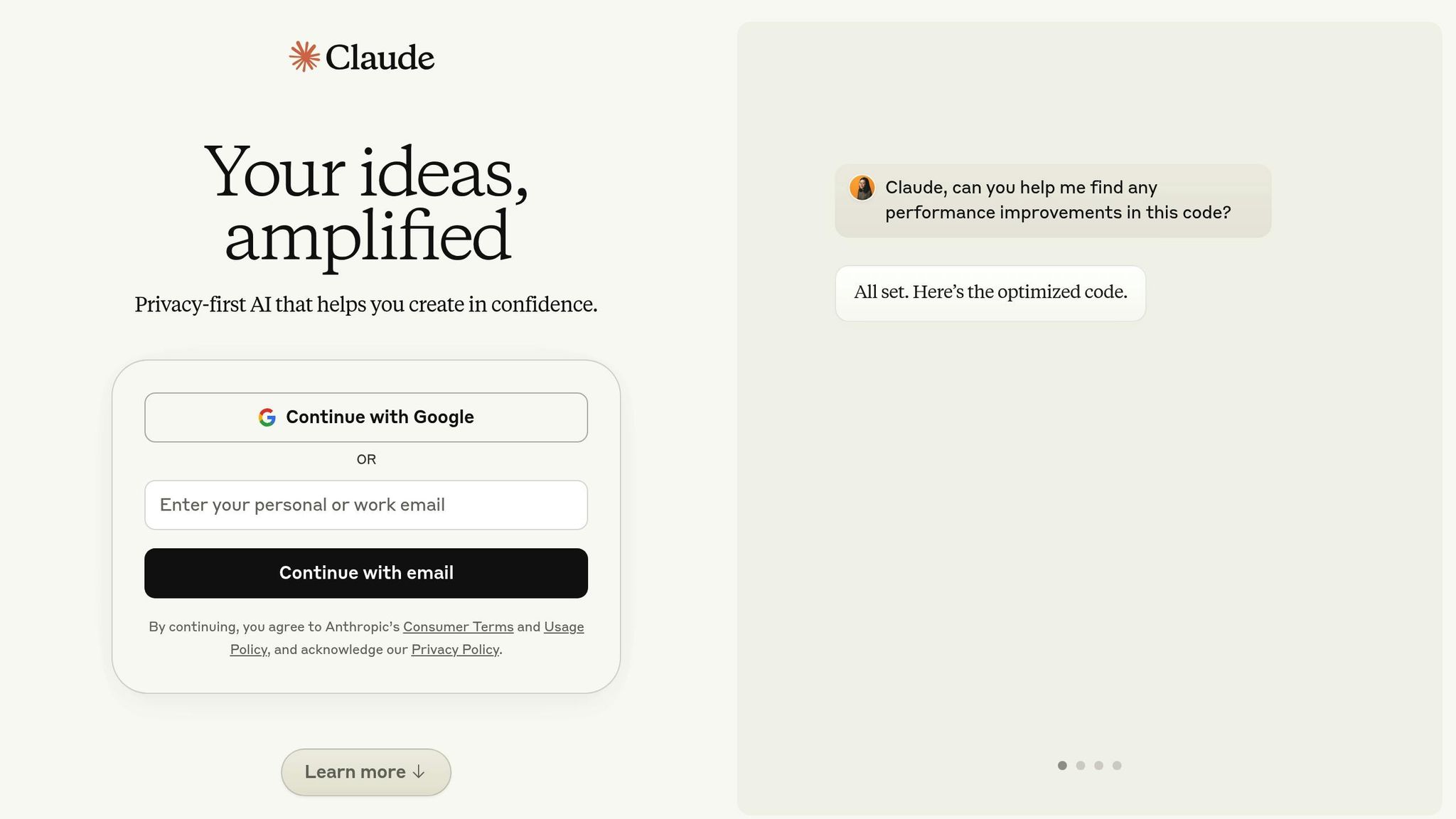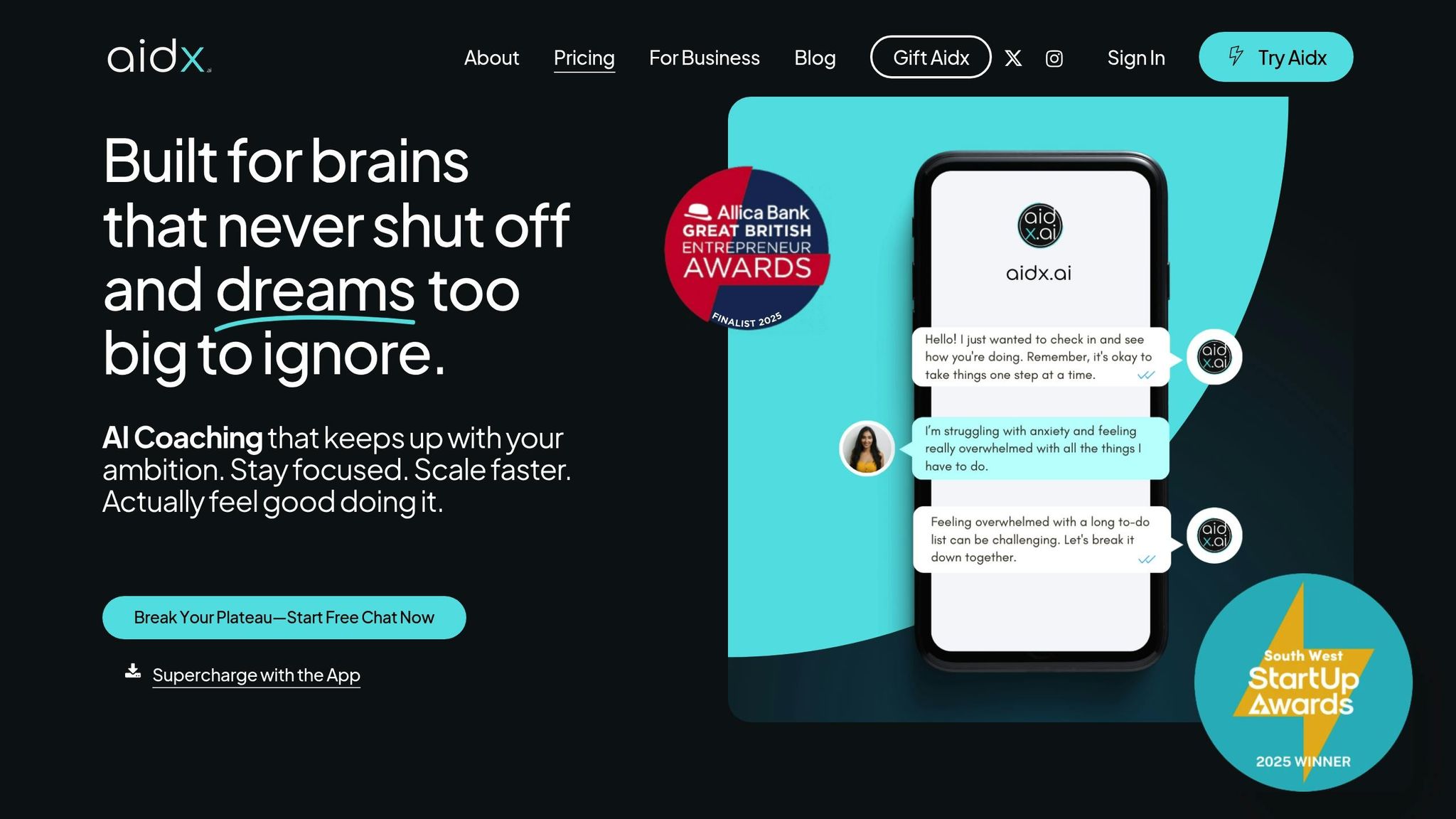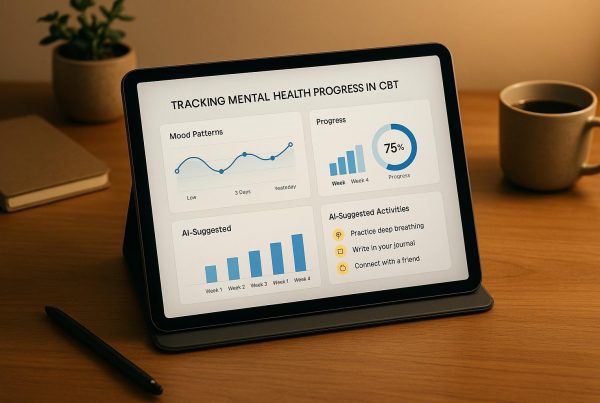AI coaching is transforming how people navigate career changes by offering personalized, 24/7 support tailored to individual challenges. Whether you’re switching industries, moving up the ladder, or returning to work after a break, AI platforms provide tools to identify skill gaps, practice soft skills like communication and emotional intelligence, and track progress. Unlike traditional options, AI solutions are more accessible and flexible, making career guidance available anytime.
Key Highlights:
- Career Challenges: Skill gaps, financial stress, and emotional hurdles like self-doubt are common during transitions.
- AI Benefits: Platforms analyze your strengths, suggest tailored learning paths, and offer real-time feedback.
- Soft Skills Focus: AI helps users improve resilience, emotional intelligence, and communication, critical for career success.
- Example Platform: Aidx.ai uses advanced methods like CBT and NLP to provide practical career support, blending AI efficiency with human expertise when needed.
AI coaching simplifies career transitions by creating structured, actionable plans while addressing both emotional and practical needs.
AI Became My Career Coach (Found Job, Wrote Resume, Blew My Mind) – Claude + Bright Data MCP

What Career Transitions Look Like
Careers today are far from the one-company-for-life model of the past. Instead, professionals now face multiple transitions throughout their working years. Understanding these shifts – and why they’re so common – can help you navigate your next move with confidence.
Types of Career Transitions
Career transitions come in many forms, each with its own challenges and opportunities:
- Vertical moves: These involve climbing the ladder within your current organization, like moving from a marketing coordinator to a marketing manager. It’s about building on what you already know while taking on new responsibilities and leadership roles.
- Horizontal moves: This is when you switch to a different department or role within the same company. For instance, a software engineer might shift to product management, using their technical knowledge in a more strategic way. It’s a chance to develop new skills while gaining fresh perspectives.
- Complete career changes: These occur when you leave one industry for another, such as moving from finance to teaching or from corporate law to running a nonprofit. These shifts often demand significant skill-building and a whole new mindset.
- Return-to-work transitions: Professionals re-entering the workforce after time away – whether for family, education, or personal reasons – often need to update their skills, rebuild networks, and adjust to changes in workplace culture and technology.
- Career pivots: These involve applying your existing skills in a new context. A journalist might become a content marketing manager, or a teacher might move into corporate training. These transitions leverage transferable skills while opening doors to new opportunities.
Each of these transitions comes with its own set of challenges, emphasizing the need for tailored strategies to succeed.
Common Career Transition Challenges
Career changes can feel overwhelming, especially without preparation. Here are some frequent hurdles professionals face:
- Skill gaps: Whether it’s learning new tools, mastering industry-specific knowledge, or adapting to different workflows, skill development is often a top priority during transitions.
- Financial stress: Switching careers can mean a temporary loss of income, especially when starting fresh in a new field. For many, this happens at a time in life – around age 39 on average [4] – when financial responsibilities like mortgages and family expenses are at their peak.
- Emotional and psychological barriers: Career changes are ranked as the 18th most stressful life event [4]. It’s not just about the job – it’s about identity. As Yale School of Management Professor Amy Wrzesniewski explains:
"It’s symbolic of the things you care about. It’s symbolic of your talents. It’s symbolic of your offering to the world" [6].
This can lead to self-doubt, fear of failure, and uncertainty about the future. - Rebuilding networks: Moving into a new industry often means starting from scratch with professional connections. Establishing credibility and forming new relationships can be a steep climb.
- Adapting to the learning curve: New environments bring unfamiliar technologies, workplace cultures, and communication styles. For those who’ve spent years in a single role, the adjustment can feel especially daunting.
Why Soft Skills Matter
While technical skills often dominate discussions around career transitions, soft skills are what truly set successful changers apart. These human-centered abilities are essential for navigating new challenges and building relationships.
- Adaptability and resilience: Bouncing back from setbacks, learning from mistakes, and adjusting to new situations are crucial. Career coach Dawn Graham highlights this, saying:
"The emotional rollercoaster of career change is real, and managing those emotions is key to a successful transition" [6].
- Communication skills: Whether you’re pitching your value to an employer, networking, or collaborating with new colleagues, clear and effective communication helps you build credibility quickly.
- Emotional intelligence: Navigating new workplace dynamics requires understanding your own emotions and reading social cues. Building rapport and managing stress are critical to thriving in unfamiliar environments.
- Growth mindset: Those who embrace learning, view challenges as opportunities, and stay curious are better equipped to handle obstacles and seize new possibilities.
The importance of these skills is backed by data. A 2022 Pew Research Center study found that 60% of workers who changed jobs reported an increase in real earnings [7]. This suggests that those who adapt well to transitions often come out ahead, with soft skills playing a key role in their success.
In today’s fast-moving job market, where 72% of Gen Zers and 66% of millennials plan to change careers within the next year [5], these skills are more relevant than ever. Preparing for these shifts lays the groundwork for strategies like AI coaching, which can offer tailored support during career transitions.
How AI Coaching Supports Career Growth
Navigating a career change can feel like venturing into uncharted territory. Traditional coaching methods often come with challenges like scheduling conflicts, high costs, and limited availability. But AI coaching platforms are reshaping how professionals approach career development, offering a blend of accessibility and tailored guidance.
Always-On, Tailored Support
One of the standout features of AI coaching is its 24/7 availability. Unlike human coaches who operate within set hours, AI platforms are ready whenever you need them. Whether it’s late-night interview prep, mid-day stress management, or weekend career planning, AI tools provide support that fits into your schedule.
This constant accessibility is a game-changer for busy professionals or those working across different time zones. Beyond availability, AI coaching adapts to your unique needs and emotional state. For instance, if you’re feeling overwhelmed about a career shift, the AI might suggest stress management strategies. On the other hand, if you’re energized and eager to move forward, it could focus on actionable goal-setting and planning.
The personalization doesn’t stop there. These platforms analyze your communication style, track your progress, and adjust their recommendations over time. This means every interaction is designed to meet you where you are, offering guidance that feels relevant and specific to your situation.
Turning Data Into Career Insights
AI coaching platforms excel at transforming raw data into meaningful career advice. By analyzing your skills, work history, preferences, and even emotional cues, these tools can pinpoint strengths, identify skill gaps, and highlight potential career opportunities. They also integrate job market trends and hiring criteria to provide actionable recommendations.
For example, an AI coach might notice your background in marketing and your growing interest in data analytics. It could suggest targeted courses to bridge the gap between these fields while also highlighting how your current skills, like project management or client communication, can transfer to a new role.
When it comes to job searches, AI platforms go beyond basic keyword matching. They analyze job descriptions, company cultures, and user profiles to recommend positions that align with your skills and values. This deeper level of matching helps streamline the process, connecting you with opportunities that truly fit.
Platforms like Aidx.ai are at the forefront of this data-driven approach, using these capabilities to provide comprehensive career support.
Spotlight on Aidx.ai

Among the growing number of AI coaching platforms, Aidx.ai has carved out a niche for professionals navigating career transitions. Recently named AI Startup of the Year by the UK Startup Awards (South West), Aidx.ai is redefining what AI coaching can offer.
The platform’s Adaptive Therapeutic Intelligence (ATI) System™ sets it apart. By incorporating evidence-based methods like CBT, ACT, DBT, and NLP, Aidx.ai delivers personalized, on-demand coaching tailored to the emotional and practical aspects of career changes. The voice-enabled interface, paired with tools for planning and self-monitoring, makes it easier to set goals, track progress, and transition seamlessly between AI and human-guided support.
Aidx.ai also offers specialized features like microcoaching for quick advice, visualization tools for mapping out career goals, and incognito sessions for more sensitive discussions. What’s particularly noteworthy is its hybrid model, which combines AI efficiency with human expertise. Through its Practitioner Mode, users can connect with vetted human coaches or therapists for deeper support when needed.
This blend of real-time insights, emotional support, and skill-building tools helps users tackle both the practical and personal challenges of career transitions. By addressing immediate concerns while fostering long-term growth, Aidx.ai provides a holistic approach to career development that’s both dynamic and effective.
Building Soft Skills Through AI Coaching
Navigating a career change often requires more than just technical know-how. It demands strong soft skills – like adaptability, communication, and emotional intelligence – to handle workplace dynamics and thrive in new environments. AI coaching platforms are stepping up to the challenge, offering personalized tools, real-time feedback, and practical techniques to help professionals sharpen these crucial abilities.
Building Flexibility and Resilience
Adjusting to new roles or industries means being flexible and resilient. AI coaching platforms provide a safe, pressure-free environment where users can practice responding to unexpected scenarios, explore alternative viewpoints, and develop the mental agility needed for smooth transitions.
Take Aidx.ai’s Adaptive Therapeutic Intelligence (ATI) System™, for example. It uses proven methods to help users reframe tough situations and build resilience. Through interactive voice sessions, the platform walks you through scenarios like recovering from job interview rejections, adapting to shifting industry norms, or managing the uncertainty that comes with career exploration.
The platform also offers an Embodiment mode, which takes things a step further by allowing you to visualize and even simulate your desired future. Whether you’re imagining walking into a new office, presenting in unfamiliar settings, or networking with potential employers, this immersive approach helps reduce anxiety and boost confidence.
For those moments when stress feels overwhelming, microcoaching sessions deliver quick, five-minute strategies to help you regain focus. These bite-sized sessions, combined with timely notifications and encouragement, keep you motivated and on track during challenging periods.
Interestingly, research reveals that 68% of users prefer a blend of human and AI-driven career services [8]. This combination of AI efficiency and human insight helps build the resilience needed for long-term success. But resilience alone isn’t enough – you also need strong communication skills to put it into action.
Improving Communication Skills
When transitioning careers, being able to communicate effectively can make all the difference. Whether you’re networking, interviewing, or building credibility in a new role, clear and confident communication is key. AI coaching platforms help you refine these skills through practice and feedback.
Aidx.ai’s voice-enabled coaching lets you rehearse real-world workplace conversations, working on everything from tone and pacing to overall delivery – all while going about your daily routine.
The platform’s targeted practice scenarios focus on specific challenges, like addressing career gaps, negotiating salaries, or explaining how your skills apply to a new industry. Integrated NLP techniques (Natural Language Processing) identify any communication habits that might hold you back, offering tailored exercises to improve them.
For those who experience communication anxiety, these platforms provide a judgment-free zone to try out new techniques and build confidence. This helps you approach conversations with potential employers or colleagues more self-assuredly.
Developing Emotional Intelligence
Emotional intelligence is another critical skill for navigating career changes. It helps you handle rejection, uncertainty, and the complexities of new workplace dynamics. And it’s increasingly in demand – consider this: only 27% of global managers report being actively engaged at work, and just 33% of employees say they’re thriving [9]. These stats highlight the need for professionals who can connect meaningfully with others.
Aidx.ai addresses this need with its integrated tracking system, which monitors emotional states, confidence levels, stress, and anxiety over time. This data-driven approach helps users identify patterns, recognize triggers, and develop healthier responses to workplace challenges.
The platform also incorporates DBT techniques (Dialectical Behavior Therapy) to help regulate emotions in high-pressure situations, like job interviews or networking events. By guiding users to pause, reflect, and choose constructive responses, it builds emotional awareness and control.
While AI can simulate empathy and analyze sentiment, it doesn’t replace the nuanced understanding that human coaches bring [9]. That’s why platforms like Aidx.ai combine AI’s efficiency with human expertise, offering hybrid models to tackle more complex emotional challenges.
With regular practice and real-time feedback, AI coaching platforms create an environment where emotional intelligence can grow naturally. The combination of personalized guidance, instant availability, and progress tracking helps professionals navigate career transitions with greater ease and confidence.
sbb-itb-d5e73b4
How to Use AI Coaching for Your Career Transition
AI coaching can take the uncertainty out of career changes by providing a structured plan to help you move forward. With the right tools and steps, you can build the skills needed to navigate your transition successfully.
Self-Assessment and Goal Setting
The first step in any career transition is understanding where you stand. AI coaching platforms often start with detailed assessments that evaluate your skills, experiences, and interests[2]. These assessments use data-driven algorithms to highlight your strengths and pinpoint areas for improvement.
Take Aidx.ai, for example. It goes beyond the basics by incorporating its Adaptive Therapeutic Intelligence (ATI) System™. This system guides you through reflective exercises that help you understand not just your professional abilities but also your emotional tendencies. By identifying patterns in your thoughts and behaviors, the platform helps you better prepare for the challenges of a career shift.
Once you’ve assessed your starting point, set SMART goals – specific, measurable, achievable, relevant, and time-bound. For instance, you might aim to "schedule three informational interviews this month" or "practice public speaking for 30 minutes each week." Aidx.ai’s planning system can help you break these goals into smaller, actionable steps. It even sends you reminders via push notifications, messaging apps, or email to keep you on track. For example, if you excel in analytics but struggle with networking, the AI might recommend attending industry events or reaching out to new contacts as part of your action plan.
Using Targeted Exercises
After setting your goals, the next step is building the skills to achieve them. AI coaching platforms offer targeted exercises designed to accelerate your progress. These programs adapt to your pace, making adjustments as you improve or face challenges.
Microcoaching sessions, for instance, provide quick, five-minute exercises that focus on practical strategies you can apply immediately. If you’re preparing for interviews in a new field, one session might help you articulate how your existing skills transfer to a different industry.
For a deeper level of practice, Aidx.ai’s "Embodiment" mode uses visualization and experiential techniques. Instead of just reading about networking, you simulate real scenarios – like walking into an event, starting conversations, and handling tough questions. This hands-on approach not only builds confidence but also helps you develop muscle memory for when you’re in similar situations.
The exercises are smartly adaptive. If you’re struggling with a particular skill, the system offers extra practice opportunities. And if you’re excelling, it moves you to more advanced challenges. Aidx.ai also keeps you engaged with timely follow-ups, reminding you to apply what you’ve learned in real-world situations. For instance, after completing a communication exercise, the AI might prompt you to use the technique in an upcoming meeting and then check back to review how it went.
Tracking Progress and Applying What You Learn
AI coaching isn’t just about learning – it’s about tracking your growth and applying new skills in everyday situations. Advanced platforms monitor your progress, from skill development to emotional well-being, and provide insights to guide your next steps[1].
Aidx.ai, for example, offers tools to track metrics like confidence, stress, and performance. Its dashboards give you a clear picture of your progress, showing what’s working and where adjustments are needed. This kind of feedback helps you make smarter decisions about where to focus your energy.
But the real magic happens when you take what you’ve learned and put it into practice. AI coaching platforms encourage you to set actionable tasks and reflect on your experiences. Imagine you’ve practiced a new networking technique. After attending an event, you can review the experience with your AI coach, identifying what went well and what could be improved. This cycle of practicing, applying, analyzing, and refining helps solidify new habits over time.
Tracking your progress also keeps you motivated during tough moments. Career transitions often come with setbacks, like a rejected job application or an awkward conversation at a networking event. Seeing tangible evidence of your improvement – like higher confidence scores or completed milestones – can make those challenges feel less daunting. For example, if you notice that your confidence dips before events but rises afterward, you can adjust your preparation strategy to feel more ready next time. By continuously monitoring your progress, you stay focused on your goals and better equipped to handle whatever comes your way.
Privacy, Security, and Working with Human Coaches
Navigating a career transition often involves sharing sensitive details – your current role, future aspirations, and even personal challenges. Naturally, this raises concerns about privacy and security. At the same time, blending advanced AI tools with human expertise can provide a more well-rounded approach to career development. Let’s explore how platforms like Aidx.ai address these needs.
Keeping Your Data Private and Secure
When using digital platforms for coaching, privacy is a key concern. Whether you’re discussing workplace dynamics, career challenges, or personal growth, protecting your data is essential. A 2023 survey by the International Coach Federation revealed that 62% of coaching clients worry about data privacy when using digital tools. This underscores the importance of strong security measures[3].
Aidx.ai takes these concerns seriously. The platform is fully GDPR-compliant and employs end-to-end encryption to safeguard all data during transmission and storage. Your sessions remain private, with no human review unless legally required. This means you can discuss topics like salary negotiations or workplace conflicts without hesitation.
For those needing extra discretion, Aidx.ai offers an Incognito Mode, which automatically deletes session data after 30 minutes. This feature is especially useful for executives dealing with confidential transitions or individuals addressing sensitive workplace issues.
According to a 2024 Gartner report, 70% of organizations implementing AI coaching tools identified GDPR compliance and end-to-end encryption as critical factors when selecting vendors[3]. If you’re exploring AI coaching platforms, always review their privacy policies, ensure they meet these standards, and access them through secure devices and networks.
While data protection is vital, having access to human expertise can add depth to your career development process.
Working with Human Practitioners
AI coaching offers personalized, on-demand support, but integrating human expertise can take it a step further. It’s not a matter of choosing between technology and human guidance – platforms like Aidx.ai show how the two can complement each other.
Through its Practitioner Mode, Aidx.ai connects users with human coaches. This feature allows professionals to assign tasks, monitor progress, and provide tailored guidance without needing to be available 24/7. For users, it means a balanced approach: instant AI insights paired with the empathy and nuanced understanding only a human can provide.
This hybrid model ensures you receive support tailored to your needs at various stages of your career journey. Whether you’re exploring new opportunities or tackling workplace challenges, the combination of AI scalability and human expertise creates a more comprehensive coaching experience.
Ultimately, trust is the cornerstone of effective coaching. By prioritizing data security and blending AI with human support, platforms like Aidx.ai enable you to confidently explore career options and find the guidance that suits your unique situation.
Conclusion: Changing Careers with AI Coaching
Switching careers doesn’t have to feel like an uphill battle anymore. AI coaching is reshaping how professionals tackle career changes, focusing on personal growth and soft skills in ways that traditional methods often overlook.
What sets AI coaching apart is its ability to craft a plan tailored specifically to you. By analyzing your strengths, weaknesses, and career aspirations, these platforms create personalized learning paths that zero in on what you need most during a transition. Whether you’re jumping into a new industry, aiming for a promotion, or exploring an entirely different field, AI coaching offers ongoing support that evolves alongside your goals.
One of the biggest advantages? AI coaching removes barriers like high costs, rigid schedules, or location constraints. It brings professional-grade career guidance to a broader audience, offering tools and insights that were once reserved for a select few.
With 24/7 availability, these platforms provide a safe space for exploring new opportunities while sharpening essential soft skills like communication, emotional intelligence, and flexibility – qualities that are critical in today’s fast-changing job market.
Take Aidx.ai, for example. This platform showcases how far AI coaching has come by blending evidence-based coaching practices with voice-enabled tech and detailed progress tracking. Recognized as AI Startup of the Year by the UK Startup Awards, Aidx.ai uses its Adaptive Therapeutic Intelligence (ATI) System™ to provide real-time, customized support, helping users confidently navigate career transitions.
Features like planning tools, progress tracking, and multi-channel reminders ensure career development becomes a continuous journey rather than a series of disconnected steps. This approach transforms transitions into measurable, actionable experiences. You can set clear goals, track your progress, and stay accountable – keeping motivation high every step of the way.
It’s important to note that AI coaching doesn’t aim to replace human expertise. Instead, it complements it. While AI provides scalable, instant insights, human coaches step in for deeper, more nuanced guidance when needed. This synergy ensures you get the best of both worlds – AI’s efficiency and human understanding.
As the job market continues to change, AI coaching meets the demand for faster, more personalized career solutions. Beyond just helping you land your next role, it equips you with the skills, confidence, and adaptability to thrive in any professional setting, offering a more accessible and impactful alternative to traditional career development methods.
FAQs
How is AI coaching more accessible and flexible compared to traditional career coaching?
AI coaching offers a level of accessibility and convenience that’s hard to beat. Unlike traditional career coaching, which often involves scheduling appointments and attending in-person sessions, AI coaching is available around the clock. Need advice during a late-night brainstorming session or while taking a quick break? AI coaching is ready whenever – and wherever – you are. It’s designed to fit effortlessly into your busy day, whether you’re commuting, multitasking, or just trying to squeeze in a moment of self-improvement.
With tools like voice-enabled interfaces and compatibility across multiple platforms, AI coaching adjusts to your needs as they evolve. It’s a seamless way to stay on track with your personal and professional goals, perfectly suited for the fast-paced demands of modern life.
How do soft skills impact career changes, and how can AI coaching help improve them?
Soft skills play a key role during career transitions, helping professionals adjust to new environments, communicate clearly, and tackle challenges with confidence. Skills like emotional intelligence, collaboration, and the ability to adapt often make the difference in standing out in today’s competitive job market.
AI coaching can be a powerful tool in building these skills. By providing personalized, real-time guidance, it tailors its support to fit your specific needs. With features like scenario-based coaching and adaptive feedback, AI can help sharpen your communication, improve problem-solving skills, and strengthen emotional resilience – qualities that are crucial when navigating career shifts. This focused guidance prepares you to excel in any professional setting.
How does Aidx.ai protect my privacy and data during career coaching sessions?
Aidx.ai takes your privacy and data security seriously by implementing end-to-end encryption for all data, whether it’s being transmitted or stored. This means your personal information stays protected and out of reach, with no human access or review unless required by law – guaranteeing your confidentiality.
The platform is also fully GDPR-compliant, putting you in control of your data while upholding top-tier security measures. For added privacy, features like Incognito Mode allow you to have private sessions that automatically erase after 30 minutes, giving you an extra level of discretion.



